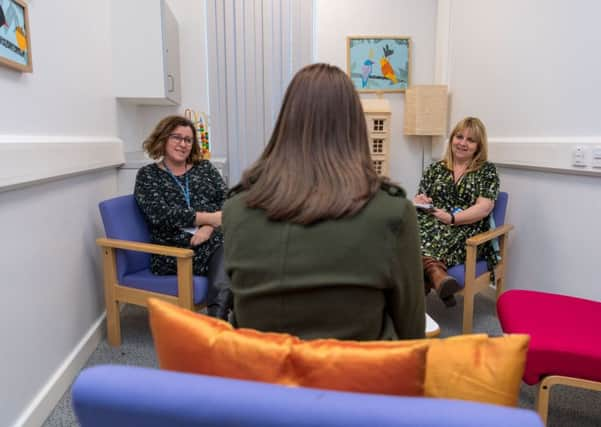Eating Disorders Awareness Week: Woman shares childhood experiences


Psychologists in Leeds have today underlined that the sooner young people get help, the better chance they have at making a full recovery.
On the second day of the YEP’s series, launched as part of Eating Disorders Awareness Week, a woman who grappled with eating disorders throughout childhood is also speaking out and urging others to get the help they need.
Advertisement
Hide AdAdvertisement
Hide AdSarah Thompson*, who has battled different eating disorders since she was just eight years old, says catching the early signs is vital.
Now 25, she is sharing her experiences to encourage families and friends of youngsters to spot the signs so they can access that all-important help.
Sarah struggled with binge-eating as a child which led to her becoming overweight, and she later suffered from bulimia as a teenager.
Advertisement
Hide AdAdvertisement
Hide Ad“It started when I was about eight but I only started seeking treatment when I was around 19 or 20 years old,” she told the YEP.
“From being eight until about 11, there was a lot of secret eating. I raided the cupboards as soon as anyone went out of the house and I would buy lots of snacks when I was out.”
At just 11 years old, unhappy with her weight, Sarah started a strict Weight Watchers regime.
Advertisement
Hide AdAdvertisement
Hide Ad“I followed it ridiculously,” she said. “It just took over. I got very obsessive at a young age and I was making weight plans as a child.”
Her eating disorder developed into bulimia by 18, and Sarah lost four stone in two-and-a-half years.
“I just went back to binge eating at 18 and then made myself sick,” she said.
“I was doing Weight Watchers and I lost the weight quite gradually, two or three pounds a week.
Advertisement
Hide AdAdvertisement
Hide Ad“But people were like ‘oh she’s doing a socially-acceptable plan’, so they weren’t concerned.
“It would have helped a lot if I’d had that early intervention.”
She has been accessing treatment since 2014.
Sarah is urging families to get children the help they need at an early stage.
“I think if somebody had just sat down with me or if they had been monitoring me, it would have been helpful. My advice to others would be try to find someone that you are comfortable talking to and speaking about your concerns.
Advertisement
Hide AdAdvertisement
Hide Ad“If you have any worries at all, go to your GP because they may be able to refer you or help you manage it in a different way.”
Her call is being echoed by the Eating Disorders Team at Leeds Community Healthcare NHS Trust, which is encouraging families to spot the symptoms early in children. Based at The Reginald Centre in Chapeltown, the NHS trust launched its eating disorders team in 2016 under the Child and Adolescent Mental Health Service (CAMHS) banner.
It provides specialist community clinics - helping young people with eating disorders ranging from bulimia to anorexia - offering assessments, intervention and treatment.
The service received more than 100 referrals for children up to the age of 18 between October 2016 and September 2017.
Advertisement
Hide AdAdvertisement
Hide AdDr Julie Franklin, consultant clinical psychologist at the trust, said: “Eating disorders can be hard to beat and we know that the help and support a young person receives from their family during this time is invaluable.
“Arriving at our service is a huge step for the people we see. We often meet young people who think they don’t need to be here but we know that the sooner they get help, the better chance they have of making a full recovery.”
*Names changed.
Warning signs to be aware of
The Leeds young people’s eating disorders team is urging people to contact their GP if they have concerns about themselves or a family member.
Potential signs of an eating disorder include the following:
- Constant or strict dieting
- Eating in secret
- Excessive exercise
- Missing meals or claiming they have eaten
- Eating slowly or obsessive behaviour around food
- Weight checking
- ‘Bingeing’ on large amounts of food
- Distorted beliefs about body size
- Often tired